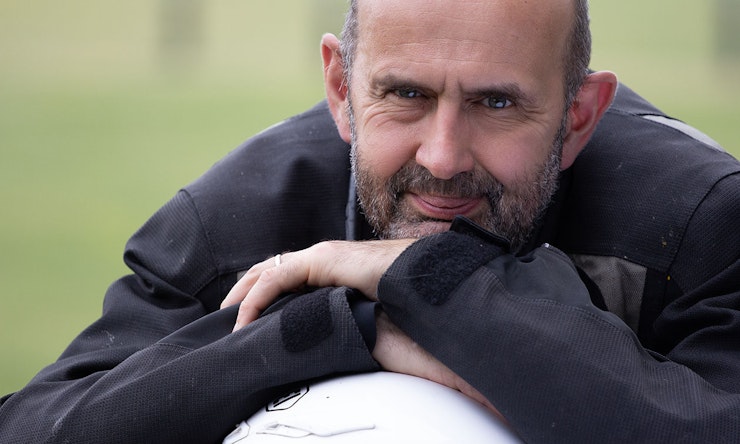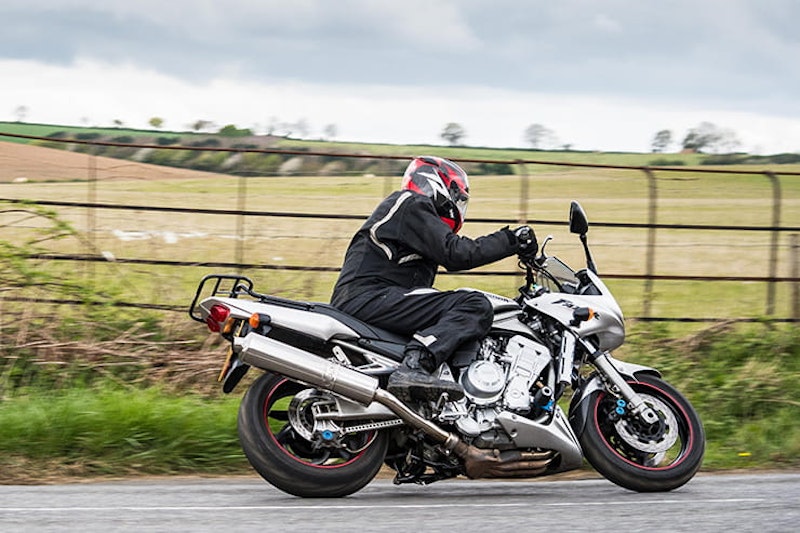Blog: Why motorcycling should be available on prescription
By Steve Rose
BikeSocial Publisher
04.01.2019
Having successfully completed my Xmas ‘Pre-Tox’ diet of chocolate, pies and booze apparently, I now apparently have to work it (whatever ‘it’ may be) and spank myself with the thorny branches of regret. Or summat.
Thankfully I don’t have to worry about dieting, detoxing or this year’s favourite exercise DVD because riding a bike is a brilliant way to lose weight, get fitter, be happier and fight dementia. Seriously, motorcycling is so flipping good for you it should be available free on the NHS.
I know this because a few years back I was the lab-rat in an experiment to measure calories burned while riding, and the brain chemistry of a 38-degrees lean angle on the B1190. Boffins at Nottingham University stuck sophisticated heart rate monitors to my chest, put a tube in my mouth and sat me on a static bicycle. The tube went to a machine that measured Oxygen in my breath and plotted a graph of Oxygen consumption versus heart rate as I pedalled, from which the boffins accurately calculated calories burned.
Then I rode a motorcycle, still wearing the heart monitors to record bpm alongside rpm. The bike was a Honda Hornet 600 and the December weather was dry, above freezing, but not quite grippy enough to ride the bike hard. So, the results were lower than they’d be in summer when I’d be working harder and sweating more.
Riding on country roads burned around 400 calories an hour. Which is the same as a brisk walk. To add some context, most people burn around 50-70 calories per hour when resting, moderate cycling burns around 500 calories and jogging is around 650 per hour.
A BikeSocial writer busy burning calories
So, riding a motorcycle burns almost as many calories as cycling and you don’t have to wear lycra or be killed every time you meet a truck turning left. Your motorcycle journey is likely to be longer than a cycle ride too, meaning you burn more calories per session.
The science here is that riding involves thousands of subtle body movements; keeping things upright, fighting the windblast, steering, shifting weight and bracing when braking. It might not match a spin class for effort-per-minute, but in an hour (or four) on the bike, you’ll burn more actual calories. Avoid the ‘Full English’ at the bike caff, you’ll be ready for that bikini in no time.
Biking has many other benefits, which are harder to measure, but recognisable to any rider. The single-minded focus – that feeling of being ‘in the zone’ and at one with your bike – promotes a similar brain chemistry to meditation, which helps reduce stress. And again, it’s the length of time you do it while riding that makes it so valuable.
At the other end of the scale there’s endorphins – pleasure and reward chemicals released when you exercise. Endorphins have a similar effect to Morphine – generating a feeling of ‘wellbeing’ without the needles, dental challenges or new ‘friends’.
Finally, and perhaps most interesting, is something called proprioception which is how we subconsciously manage positional changes in space and movements in our body. Experts suggest standing on one leg or using a balance ball to develop proprioception, but motorcycling (and cycling and horse riding) demand it naturally as we subtly adjust body position, reacting to changing conditions. Again though, the difference for us is we do it for longer.
Increasingly, scientists believe that better proprioception helps prevent Alzheimer's and dementia. You might take this with a pinch of salt because dementia is the disease-of-the-moment and everything seems to promote it, prevent it or both. But proprioception is at the core of our nervous system and has a direct impact on the function of the cerebellum, a part of the brain that collects neural impulses from around the body and amplifies them as they transfer to the other parts of the brain that control movement, cognition and thought. Put very simply, enhanced cerebellum function means a person has fine control of their movements, thoughts and speech. Patients with Alzheimer's and dementia often show reduced cerebellum function. Cycling and motorcycling are especially good at promoting proprioception and therefore will enhance cerebellum function and potentially reduce dementia.
Dementia, depression and obesity are the currently the biggest problems facing our healthcare system and motorcycling can directly impact all three. Wouldn’t it be great if giving everyone a motorcycle on the NHS turned out to be the most cost-effective way of making us all healthier and happier? If that’s not a reason to put biking at the heart of Government policy for health and transport, we don’t know what is.
Even if they don’t, the more you ride the more chance you have to stay mentally and physically sharp enough to enjoy riding for even longer.
Happy new year!
Share on social media:

